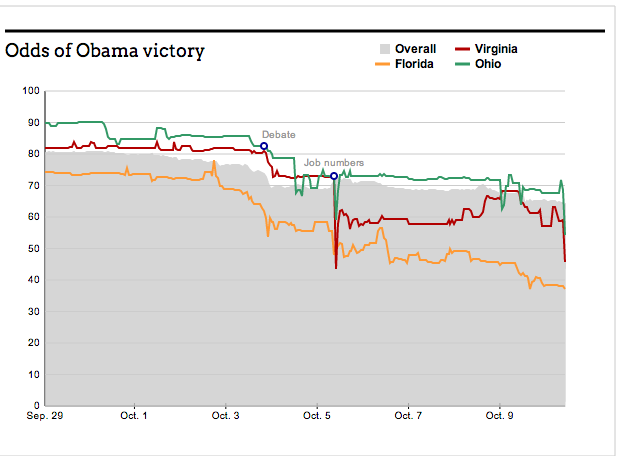Romney chips away at Obama’s lead, but electoral math still favors president
Last week's debate between President Barack Obama and challenger Mitt Romney has inflicted severe turmoil on Obama's standing in the polls, breathing new life and energy into Romney's bid. If the United States elected its presidents by popular vote, the way sane electoral systems operate, Obama's odds of re-election would have plummeted in tandem. Unfortunately for the Romney campaign, it will take more than one good night to overcome the steep uphill climb it faces in the Electoral College this year. The first debate between Obama and Romney radically altered the dynamic of the 2012 election, but it did not change the math.
It has been clear at least since February that Romney has to win Florida, Ohio and Virginia to have a viable shot at victory. This troika, along with the states safely in the Republican column, would bring Romney to 266 electoral votes. From there, he would need just one more state—say, New Hampshire—to push him over the 270 mark. All three states have moved in his favor over the past two weeks.

Sources: Betfair, Intrade, HuffPost's Pollster, RealClearPolitics.
The overall odds for Obama remain well above 60 percent for one simple reason: Romney needs all three swing states to win, while Obama needs only to deny him one of them. Right now, that rearguard action is occurring in Ohio, where Obama is maintaining his lead in the aftermath of the debate.
As the graph clearly shows, right now the states are correlated: They all move up or down in basic tandem in response to national events. By Election Day, after all the speeches have been given, all the debates played out and all the commercials aired, this will no longer be the case. The states will become individual coin tosses. If they are still in toss-up territory, it will mean Romney will need to flip heads three times in a row, while Obama will need to flip tails only once.
Follow the state-by-state and overall presidential predictions in real time with PredictWise.com.
David Rothschild has a Ph.D. in applied economics from the Wharton School of Business at the University of Pennsylvania. Follow him on Twitter @DavMicRot

